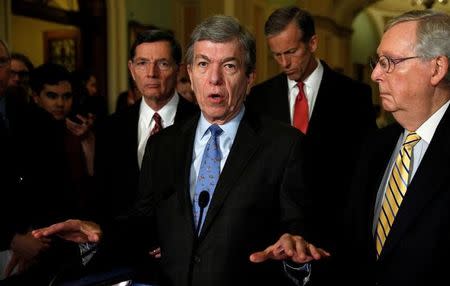Democrats see FBI controversy hurting chances in U.S. Congress races
By Richard Cowan WASHINGTON (Reuters) - Senior Democrats said on Monday their chances of winning control of the U.S. House of Representatives had been hurt by the FBI's surprise announcement last month that Hillary Clinton's email practices were again figuring in a federal investigation. Voters will go to the polls on Tuesday to choose Democrat Clinton or Republican Donald Trump for president, but also to fill 34 U.S. Senate seats in the 100-chamber body and all 435 House seats. Both the House and Senate are currently controlled by Republicans. FBI Director James Comey's letter to Congress in late October that the agency would examine newly found emails that might pertain to Clinton's use of a private server while she was secretary of state, "had a tremendous adverse impact with our standing with independents," said Representative James Clyburn, a member of the House Democratic leadership, referring to independent voters. House Democratic leader Nancy Pelosi, while calling Comey's action "out of line," said it resulted in a spike in small campaign donations. But she added: “We would be in a better place (without the letter) and in the manner he did it.” Clyburn's and Pelosi's remarks, seen by Reuters, were delivered during a phone call House Democratic leaders had with rank-and-file members. Continued Republican control of Congress could stymie the legislative agenda put forth by Clinton if she wins the presidency. A Trump win along with a Republican Congress could spell doom for Democratic President Barack Obama's landmark healthcare law known as Obamacare, which has been the target of a sustained attack by Republican lawmakers. If voters hand power to Democrats in either chamber, 2017 will likely bring a more moderate bent to bills that lawmakers send to the new president for signing into law. A senior Democratic aide said the October controversy, which consumed U.S. political campaigns for over a week, could reduce by at least 10 the number of House seats Democrats may be able to capture from Republicans on Election Day. Comey informed Congress on Sunday that he was standing by his July decision that no criminal charges were warranted against the Democratic presidential candidate in the emails investigation. But coming only two days before national elections, Comey's latest decision may have come too late for Democrats who were hoping for big wins on Tuesday to help them regain control of the House for the first time since 2010 and the Senate for the first time since 2014. "It's terribly damaging to us," the aide said, adding that Clinton's support in battleground states could be depressed, which in turn would hurt the party's House candidates. With that in mind, the aide said Democrats could end up gaining only 12 to 16 House seats on Tuesday, instead of the 30 or so needed to win back the chamber. Representative Tom Cole, a senior House Republican, said in a telephone interview he found it "mystifying in how he (Comey) has interjected himself in the election on three different occasions in ways that were probably inappropriate." Cole was referring to the initial announcement in July that Clinton would not be prosecuted, the late October letter to Congress that FBI agents were again reviewing the issue and Sunday's information that the agency would not change its July findings. Of Sunday's good news for Clinton, the Oklahoma lawmaker said: "I think it certainly takes a little steam out of the Republicans." To win control of the Senate outright, Democrats would have to score a net gain of five seats. Republicans currently hold 54 Senate seats to 44 Democratic seats and two independents who align themselves with Democrats. For much of the autumn campaign, political analysts were projecting Democrats would pick up anywhere from four to seven Senate seats. TIGHT SENATE CONTESTS The outcome of the presidential race is expected to have a major impact on the outcome of the congressional campaigns. In recent decades, the party that wins the White House has usually fared better in congressional races too. For most of the 2016 campaign season, the Senate races have been center stage, as Democrats fielded some strong challengers to Republican incumbents. Among them are Missouri Secretary of State Jason Kander, who is giving Republican Senator Roy Blunt an unexpectedly stiff challenge, and former environmental official Katie McGinty, who could unseat Republican Senator Pat Toomey in Pennsylvania. John McCain, the Vietnam War hero and 2008 Republican presidential nominee who has served in the Senate for 30 years, appears headed to re-election in a race that has been unusually competitive for him. A possible 50-50 tie following Tuesday's elections would mean that the next vice president would cast the tie-breaking vote and determine which party controls the Senate. The Senate that will be sworn in on Jan. 3, whether it is held by Republicans or Democrats, will face a weighty decision early on: voting on a U.S. Supreme Court justice to replace the conservative Justice Antonin Scalia, who died last February. Since that time, Senate Republicans have refused to consider Obama's nomination of federal judge Merrick Garland, arguing the next president should pick a nominee for Senate review. Other issues confronting Congress next year include illegal immigration and border security, the need to raise U.S. borrowing authority, something some conservative Republicans oppose without substantial budget cuts, and possible approval of free-trade deals with Pacific Rim countries and Europe if negotiations on the latter conclude successfully. (Reporting by Richard Cowan and Susan Cornwell; Editing by Jonathan Oatis and Peter Cooney)






